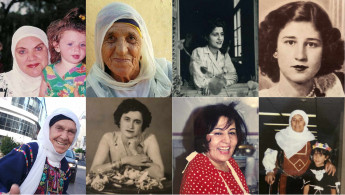Why is #MyPalestinianSitty trending? Palestinians share stories of resilient grandmothers in solidarity with Rashida Tlaib
Alongside fellow Muslim-American Congresswoman Ilhan Omar, Tlaib was abruptly banned earlier this week from entering Israel to lead a scheduled congressional delegation through the occupied West Bank.
After submitting a special humanitarian request to be allowed to visit her 90-year-old grandmother in Beit Ur al-Fouqa, a village near Ramallah, Israel U-turned and said Tlaib would be allowed to enter as long as she did not promote any boycott of Israel.
The Palestinian-American lawmaker later said she would not be visiting her grandmother, decrying the "oppressive conditions" placed on the visit.
Grandmother Muftia Tlaib would not want her granddaughter to be "silenced" and "treated like a criminal", the congresswoman said in a tweet. "It would kill a piece of me," she explained.
In response, dozens of Palestinians at home and in the diaspora have flooded to Twitter to introduce their own Palestinian grandmothers, making the hashtag #MyPalestinianSitty a trending topic on the social media site.
"Sitty" is an Arabic word for grandmother.
Many shared stories of their aged and deceased grandmothers who had lived through the darkest moment in Palestinian history - the "nakba" or "catastrophe" of 1948, when the formation of the Israeli state saw hundreds of thousands of Palestinians ethnically cleansed.
|
|
"#MyPalestinianSitty was a superhuman," Gaza-based activist and journalist Omar Gharaib said in a tweet on Sunday. "She walked barefoot with an infant on her hand, dragging 3 other young children during #Nakba after witnessing the abduction of her husband & the murder of her brother. She nearly didn't make it & refused to leave any child behind."
Another Twitter user described how her "best friend" fled from Palestine during the "nakba".
"She was born in Yaffa, Palestine in 1927. She was forced to flee in 1948 & took her children to Lebanon as refugees," she tweeted. "She passed this last April. I will go to Yaffa soon & bring sand back to her grave to honor her."
Another user told a similar tale: "#MyPalestinianSitty fled to Jordan with her family on foot after the Nakba. Kept dreaming of returning back to her homeland until she passed away in exile in Syria."
|
|
Others described how their grandmothers remained in Palestine, where they were unable to visit them.
"My parents left occupied Palestine before I was born so that they could raise me and my siblings free. Both of my tatas (grandmas) died under Israeli occupation before I could know them," Palestinian-American activist Huwaida Arraf tweeted on Saturday.
Randa Abdel-Fattah, an Australian author with Palestinian and Egyptian heritage, described how her grandmother had provided her with inspiration: "#MyPalestinianSitty inspired the grandmother in my novel… She never got to read the book I dedicated to her. She lives on in my story. It's all for her."
|
|
Another Twitter user shared the story of her grandmother, the first female equestrian in Hebron, and her mother.
"My mom hasn't seen her grave since she was a young girl & all we know now that the graveyard was destroyed, burned and built on top of," she said, adding that her family believes the grave is located in H2, the Israeli-occupied part of Hebron. "We're not permitted entry."
|
|
Others shared stories of their grandmothers who had fled Palestine during the "naksa" or 1967 war.
"#MyPalestinianSitty fled to Jordan in 1967, on foot, with 8 of her children. Although she died never able to return to Palestine, she carried her people and her culture everywhere she went," Palestinian-American MMA fighter Ramy Daoud said in a tweet.
Twitter user Ali Tamimi added: "She was forced to leave home in Nabi Saleh, Ramallah around 1972.
"She died of Alzheimer's 3 years ago, away from her homeland, but over the last few months of her life she used to think that she's back at home, in Palestine, the never forgotten," he said.
Congresswoman Omar said she was "overcome with emotions" after seeing #MyPalestinianSitty trending on Twitter and "realising how we are finally humanising one of the world's most dehumanised peoples."
|
|
The Somali-American lawmaker was not alone in expressing the significance of the hashtag.
"This hashtag #MyPalestinianSitty trending means the world to me," student Nooran Hamdan said in a tweet. "Palestinians are human... Our family's stories are defined by their survival and resilience. That isn't us politicizing our grandmothers."
"Recognizing our pain, fighting for justice and remembering what my grandmother has lived through is how I honor her every single day. How Rashida honors her grandmother," she added. "If you see that as political, that is your own problem.?





 Follow the Middle East's top stories in English at The New Arab on Google News
Follow the Middle East's top stories in English at The New Arab on Google News


